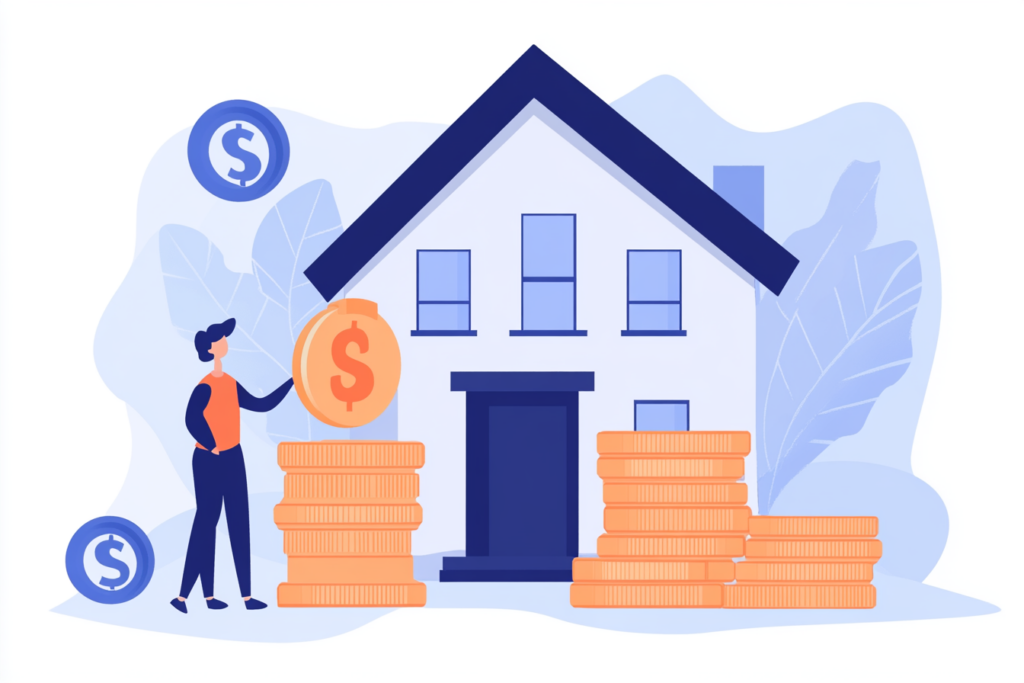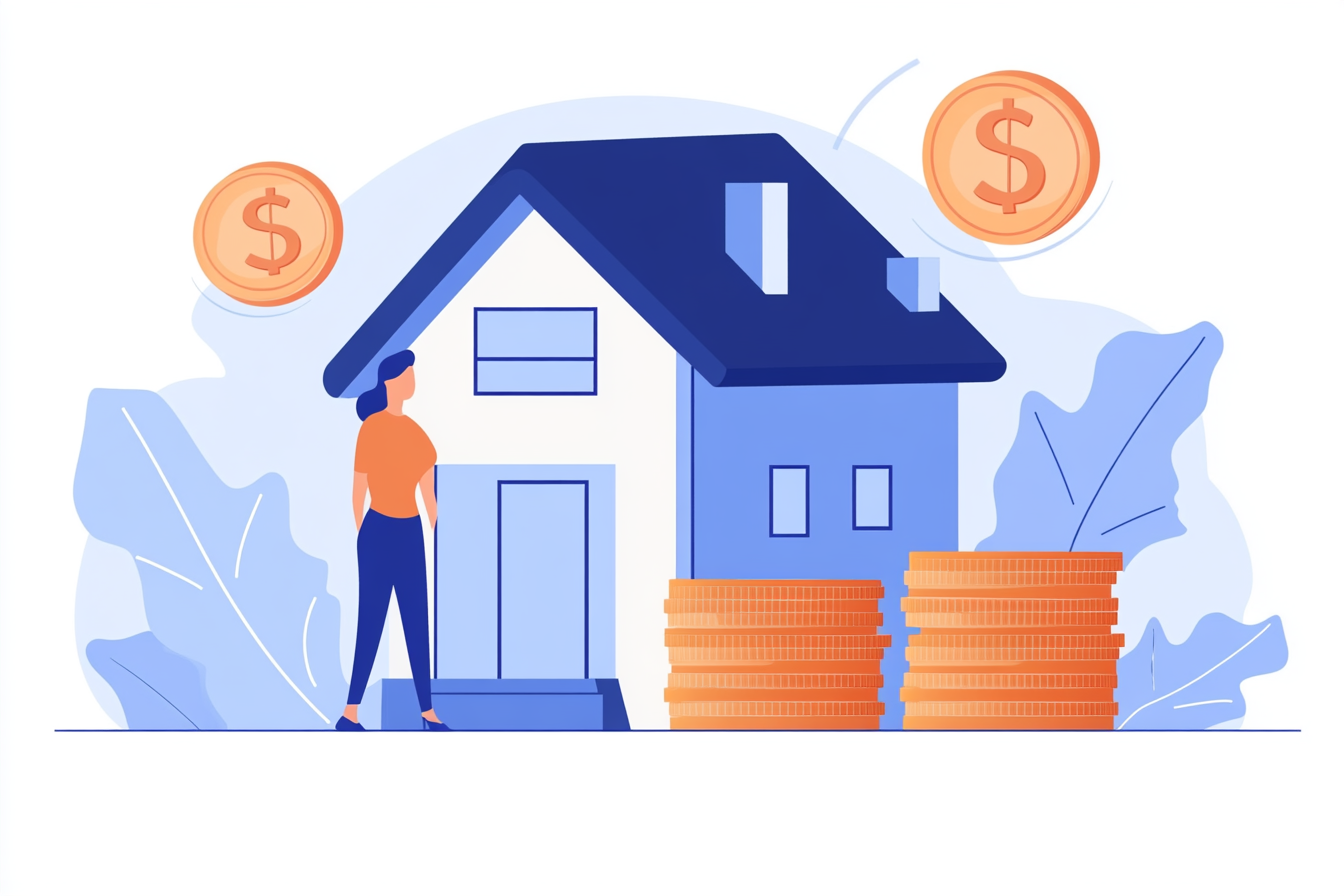People can accumulate debt for many reasons. It can be due to student loans, medical emergencies, overspending, or poor investment decisions. If you have debt, know that you’re not alone. As of 2024, the average American holds just under $105,000 in debt across mortgages, car loans, student loans, and credit cards. That’s a high number and likely adds massive amounts to the average person’s budget. However, if you’re a homeowner, you might have a not-so-secret tool to help you get out of debt faster. Keep reading to learn how to use home equity to manage debt—and understand if it’s a good idea.
What is Home Equity?
Home equity is the portion of your home that you own outright. Simply put, it’s the market value of your home minus what you have left on your mortgage. Home equity is the financial stake you have in the house.
Let’s take a look at an example so you can better understand.
Say you purchased a home for $500,000, and you’ve paid off $100,000 so far, so your remaining mortgage balance is $400,000. But, in the time you’ve owned the house, your home has risen in value and is now estimated to be worth $600,000. This means your home equity is $200,000 now. It’s the value of your home ($600,000) minus what’s left on the mortgage ($400,000).
What is a Home Equity Loan or a HELOC?
When you have equity in your home, you can take out a home equity line of credit (HELOC) or a home equity loan. Both are types of credit secured by your home.
Some of the benefits of HELOCs and home equity loans are:
- They usually have a lower interest rate than other forms of credit, such as an unsecured line of credit, personal loans, or credit cards.
- A HELOC is always available, so you can use it as needed. If you need quick funds in an emergency, you don’t have to apply for a loan and wait for approval.
- With a HELOC, you only pay interest when you use it.
- The interest paid might be tax-deductible depending on how you use your HELOC.
Should You Use Home Equity to Pay Down Debts?

If you have equity in your home and are currently struggling with debt, you might wonder if tapping into your home equity is the answer to your problems.
Sometimes, using your home equity to consolidate debts is a good decision.
The advantages of using home equity to pay down debts are:
- Less interest: Your home equity loans or credit likely have a lower interest rate than your other debts. As of April 2025, the average HELOC rate in the US is 8.05%, while the average for home equity loans is 8.40%. In comparison, the average interest rate on personal loans is 12.36%. This is a significant difference in rates. Securing a lower rate for your debt will allow you to pay less interest overall and become debt-free faster.
- One payment: If you have multiple debts, consolidating them into a home equity line of credit (HELOC) or a home equity loan can make debt repayment more manageable. You’ll only have one monthly payment and one lender to worry about. And you’ll easily be able to track your progress so you can know when you’ll be debt-free.
- Smaller payment: If you’re struggling to make all your debt payments right now, switching to a home equity loan or HELOC may help. A lower interest rate should mean a lower monthly payment, which can help you get your budget back on track.
Are There Drawbacks to Using Equity to Repay Debt?
Before you decide to use your home equity to pay off your debts, you must understand all the potential downsides.
Here are the risks and drawbacks of using your home equity to repay debt:
- Your home is at risk. If you default on your payments, your home can be subject to foreclosure.
- Your interest rate could still be high. If interest rates are high across the board right now, then consolidating to a home equity loan or HELOC might only result in a slight difference in your interest rate.
- Risk of more debt. You’ll need to ensure that you don’t fall back into overspending and find yourself in even more debt. For example, you don’t want to pay off your maxed-out credit cards only to max them out again.
- Upfront fees. Both home equity loans and HELOCs come with upfront fees and costs. You’ll need to account for these expenses when evaluating if the switch will save you money overall. Some of the fees you might come across include an origination fee, home appraisal fee, credit report fee, legal fees, notary fees, and a title search fee.
How to Use Home Equity to Manage Debt
In some scenarios, leveraging equity to manage your debt is a wise financial decision. Here are the steps you’ll want to take if you want to move forward with this plan:
- Understand your equity potential. First, you need to know if you have sufficient equity and if it will cover your debts. Research the current market rates of comparable properties in your area and compare these to your outstanding mortgage balance to get a sense of your equity.
- Research lenders. You’ll want to compare different lenders to understand what interest rates you might qualify for, as well as the costs of getting your equity loan or line of credit. Only move forward if it financially makes sense to do so.
- Apply. Once you find the best lender, apply and wait to hear back from them.
- Pay off debts. If you’re approved, the funds will be available to you within one business week. Once you see the funds, pay off all your debts.
- Make your payments. Always make your payments on time and in full, so your home is never in jeopardy.
How to Know if Using Equity for Debt is Right For Me?
Still unsure if using your home equity is the best decision moving forward? Here are a few ways to understand that you’re a good candidate for this strategy:
- You have sufficient equity in your property to cover all or most of your debts.
- Your current debt interest rates are higher than the rate you can secure with an equity loan or line of credit.
- You can’t keep up with your current debt payments, and you believe an equity loan will come with a lower rate, so you’ll have a lower monthly payment.
- You believe you can repay existing lenders without going into debt to them again.
- You know you’ll keep up with your equity loan or HELOC payments, so your home won’t be at risk.
- When you calculate the difference in interest rate and the upfront fees you’ll pay to access equity, you still save money by making the switch.
If you meet the above criteria, using your home equity to manage your debt is a solid choice. Just remember that your home is on the line, so you’ll need to be responsible in paying the debt back quickly.
You might also be interested in: Debt Consolidation vs. Debt Settlement: Which Is Right for You


